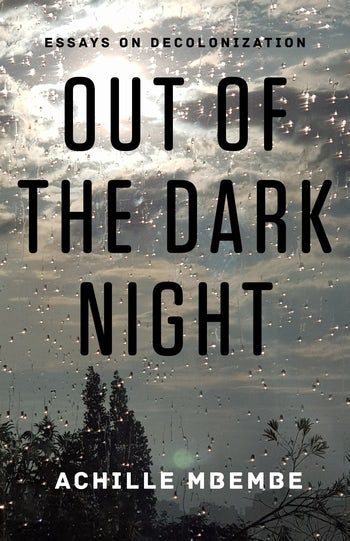 Out of the Dark Night: Essays on Decolonization, Achille Mbembe (New York: Columbia University Press, 2021), 280 pp., cloth $30, eBook $29.99.
Out of the Dark Night: Essays on Decolonization, Achille Mbembe (New York: Columbia University Press, 2021), 280 pp., cloth $30, eBook $29.99.
To reclaim ethical and philosophical paradigms after five hundred years of Western monopolization is a difficult task. To do so while Western powers remain dominant is even harder. Despite such a challenge, Achille Mbembe successfully harnesses myriad philosophical, ethical, and political discourses in a way that feels largely free of Western grandstanding about universalism and rationality. In Out of the Dark Night: Essays on Decolonization, Mbembe tackles everything from precolonial sexuality to modern immigration to the repatriation of African artworks. A kaleidoscope image of Africa and the world emerges over the course of six essays, as diffuse sociohistorical trends that govern our realities are laid out in straightforward, descriptive terms.
He begins on a planetary scale, describing the connections and the excesses brought about by globalization. Mbembe acknowledges that Africa is often seen as “the last frontier of capitalism” (p. 36), where modern financial capitalism takes on many of its most extractive and brutal forms. The economies of black bodies, objects, and lives persist into the twenty-first century, networks where countless Africans have a fundamental choice: perilous migration and economic insecurity or exclusion from the modern economy. He goes on to indict the French metropole on numerous counts of intellectual arrogance and socioeconomic paternalism. A much needed exercise in today's world, he provokes the reader to evaluate his or her own biases surrounding inequality, immigration, and popular depictions of nonwhite peoples. He asserts that colonialism was neither a civilizing gift nor a necessary historical process, and that a truly progressive ethos for the modern era must include the African experience and all its singularities. Mbembe rejects the idea that race is no longer relevant, and instead promotes a “politics of fellowship” (p. 111), one where we recognize and value the difference among people.
Thus, Dark Night is fundamentally forward looking and does not lose itself in deconstructing the misguided assumptions of Western punditry. Mbembe roots himself in a more established, independent African consciousness than his intellectual forebears could have. He does not speak as if colonialism is dead and buried, but he is able to brush aside the husk of the European intellectual monolith much more easily than those who came before him—thinkers such as Frantz Fanon, Aimé Césaire, and Edward Said.
Postcolonies exist all over the world, but to say they are free of colonial influence would be divorced from reality. This may be why Mbembe calls his book Essays on Decolonization, because even though he does not offer ways to decolonize, neither does he assume that Africa has fully escaped the economic, political, and cultural tendrils of the West. But, contrary to some modern European narratives, Mbembe demonstrates how Africa is neither a petri dish nor a passive player in the great intellectual and political experiments of the twenty-first century. Africa will be the next center of history, the staging ground where modern humanity will come to know itself, and an unbounded source of the very drive for knowledge itself.
Though Mbembe often leaves the reader wanting for more specific details and examples from modern Africa, he offers plenty of references for those hoping to take a deeper dive. Additionally, because of the breadth and eclectic diversity of topics in this book, Out of the Dark Night ends up serving as more of a compendium and synthesis of modern decolonial queries than a framework for a groundbreaking new theory. Such theories and provocative calls to action should be sought elsewhere; but if readers want an introduction to how modern Africa is disclosing and recreating its identity, they can confidently look to the work of Achille Mbembe.
—Stefan Bakumenko
Stefan Bakumenko is a Masters candidate at The George Washington University's Elliott School of International Affairs, where he studies Conflict Resolution and African Affairs.
To access a PDF of this review, please visit Cambridge Core.
More in this issue
Summer 2021 (35.2) • Review
On Obedience: Contrasting Philosophies for the Military, Citizenry, and Community
Pauline Shanks Kaurin has written an important, engaging, and timely book on obedience. As her book’s subtitle suggests, it is a work of military ...
Summer 2021 (35.2) • Review
The Laws of War in International Thought
Essential reading for any scholar interested in the laws and ethics of war, The Laws of War in International Thought reopens the questions pertaining to ...
Summer 2021 (35.2) • Review Essay
Climate Displacement and the Legal Gymnastics of Justice: Is It All Political?
The future for people becoming displaced due to climate processes is still unknown. The effects of climate change are more apparent every day, and those ...